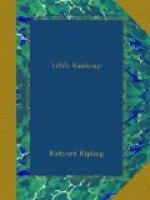But when twilight was falling, and the order of the Court was a little relaxed, there came before the king, in custody, a trembling haggard wretch, sore with much buffeting, but of stout enough build, who had stolen three rupees—of such small matters does His Highness take cognisance.
‘Why did you steal?’ said he; and when the king asks questions they do themselves service who answer directly.
‘I was poor, and no one gave. Hungry, and there was no food.’
‘Why did you not work?’
‘I could find no work, Protector of the Poor, and I was starving.’
’You lie. You stole for drink, for lust, for idleness, for anything but hunger, since any man who will may find work and daily bread.’
The prisoner dropped his eyes. He had attended the Court before, and he knew the ring of the death-tone.
’Any man may get work. Who knows this so well as I do? for I too have been hungered—not like you, bastard scum, but as any honest man may be, by the turn of Fate and the will of God.’
Growing warm, the Amir turned to his nobles all arow and thrust the hilt of his sabre aside with his elbow.
’You have heard this Son of Lies? Hear me tell a true tale. I also was once starved, and tightened my belt on the sharp belly-pinch. Nor was I alone, for with me was another, who did not fail me in my evil days, when I was hunted, before ever I came to this throne. And wandering like a houseless dog by Kandahar, my money melted, melted, melted till—’ He flung out a bare palm before the audience. ’And day upon day, faint and sick, I went back to that one who waited, and God knows how we lived, till on a day I took our best lihaf—silk it was, fine work of Iran, such as no needle now works, warm, and a coverlet for two, and all that we had. I brought it to a money-lender in a bylane, and I asked for three rupees upon it. He said to me, who am now the King, “You are a thief. This is worth three hundred.” “I am no thief,” I answered, “but a prince of good blood, and I am hungry.”—“Prince of wandering beggars,” said that money-lender, “I have no money with me, but go to my house with my clerk and he will give you two rupees eight annas, for that is all I will lend.” So I went with the clerk to the house, and we talked on the way, and he gave me the money. We lived on it till it was spent, and we fared hard. And then that clerk said, being a young man of a good heart, “Surely the money-lender will lend yet more on that lihaf,” and he offered me two rupees. These I refused, saying, “Nay; but get me some work.” And he got me work, and I, even I, Abdur Rahman, Amir of Afghanistan, wrought day by day as a coolie, bearing burdens, and labouring of my hands, receiving four annas wage a day for my sweat and backache. But he, this bastard son of naught, must steal! For a year and four months I worked, and none dare say that I lie, for I have a witness, even that clerk who is now my friend.’




